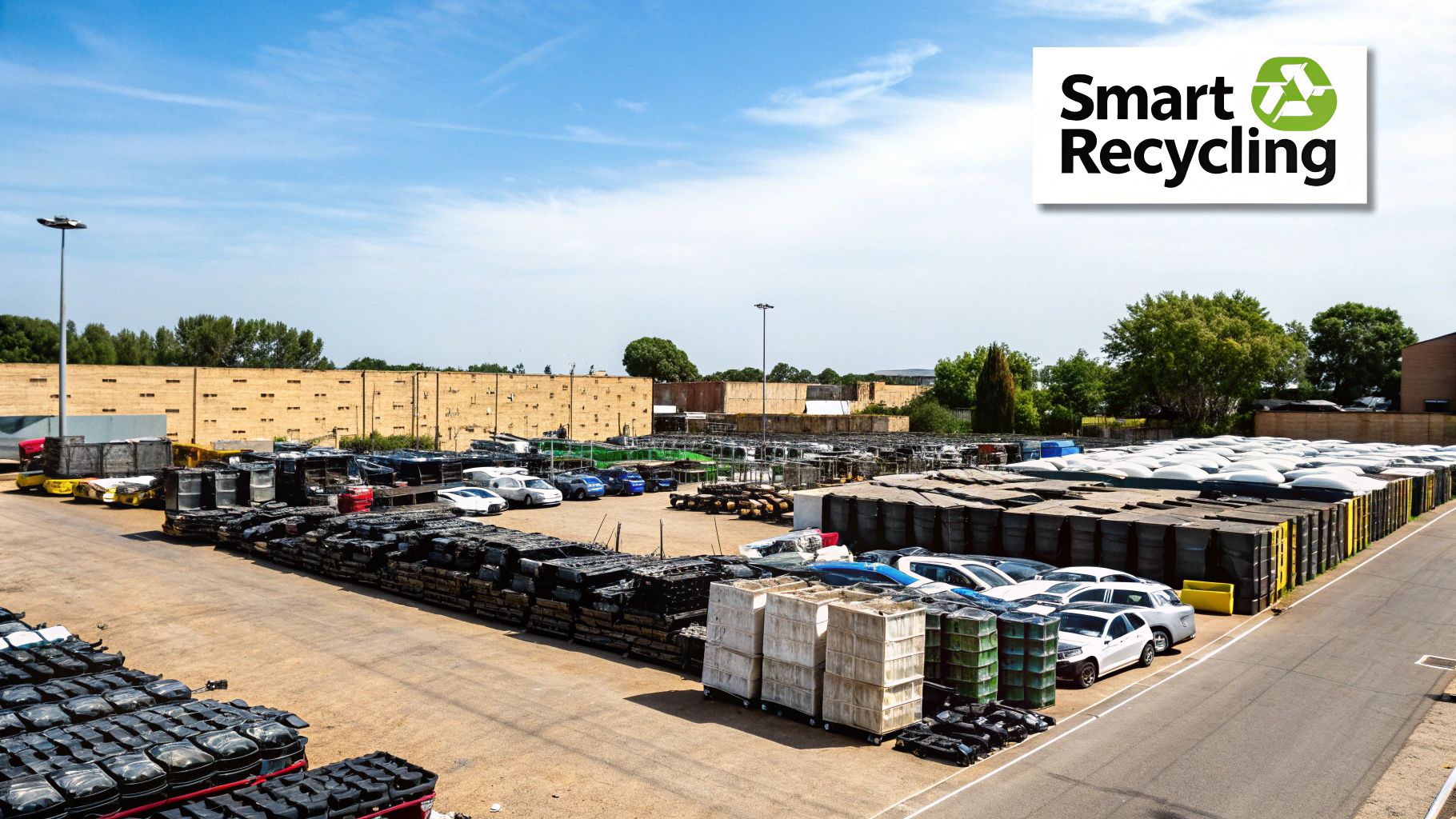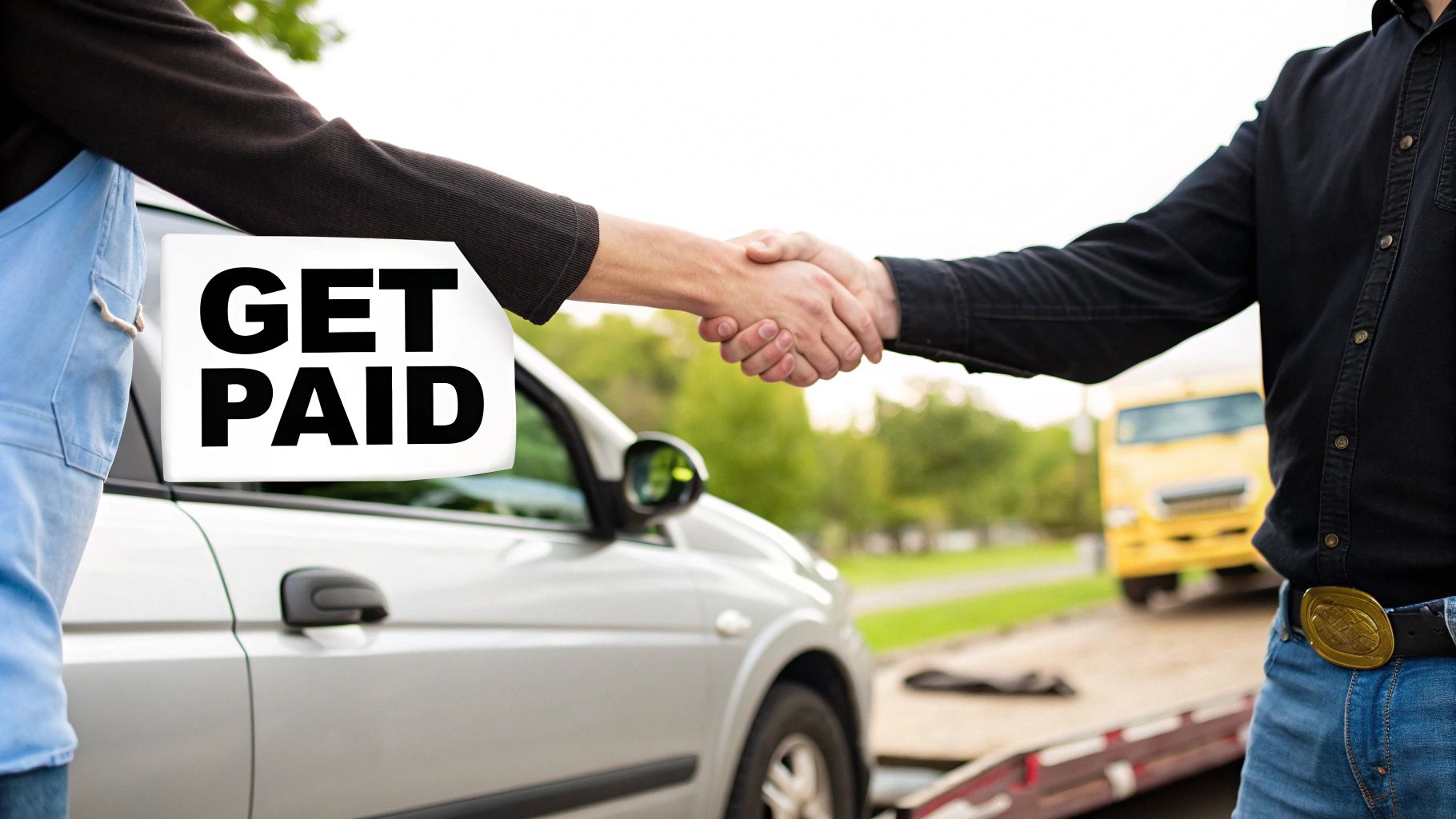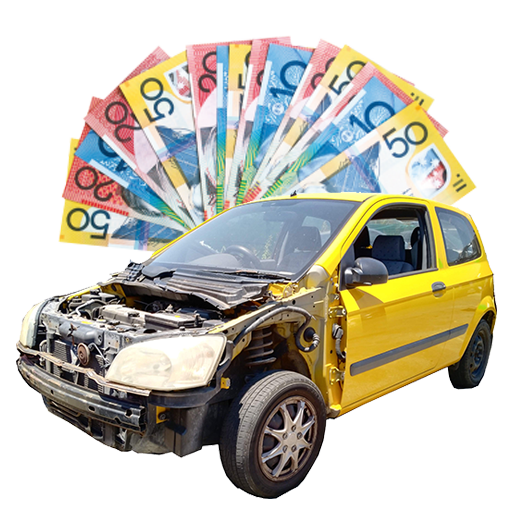Got an old car taking up space? Recycling its parts is one of the smartest, simplest ways to get some cash for it while doing a good turn for the environment. It’s all about salvaging the components that still have life in them and responsibly processing the raw materials. Your old clunker can be a goldmine for your wallet and the planet.
Why Auto Part Recycling Is a Smart Move

When you choose to recycle your vehicle, you're doing much more than just offloading a problem. It’s a genuinely clever move, both financially and environmentally. Every single car that gets recycled feeds into a circular economy, where crucial materials like steel, aluminium, and plastic are recovered and put back into use instead of just rotting in a landfill.
Think about the impact this has on our natural resources. Forging new car parts from scratch is a massively energy-hungry process, guzzling water and electricity. Auto part recycling slashes that demand, which helps conserve our resources and significantly cuts down on greenhouse gas emissions.
The Financial and Environmental Upside
The perks of recycling ripple out to everyone, from your bank account to the wider community. On the money side of things, it’s a no-brainer. A recent survey found that a huge 82% of Aussie vehicle owners are happy to buy recycled parts, mainly because it saves them a bundle. This high demand is what creates a strong, reliable market for the bits and pieces from your old car.
The numbers are pretty staggering. It's estimated that Australians could save an average of $2,144 per driver over five years by choosing recycled parts. If you scale that up, the potential nationwide savings could hit a whopping $15.5 billion. For big-ticket items like engines or transmissions, you could be looking at savings of up to 85% compared to buying new.
By recycling, you're not just earning cash for your vehicle; you're also supplying affordable, quality parts that help other drivers stay on the road without breaking their budget.
In the end, jumping into the auto recycling process gives you a double win. You’re making a real, positive impact on the environment while cashing in on the hidden value locked away in your unwanted car. Our guide on the benefits of recycling automotive parts goes into even more detail on this. It’s simply a smart move for your pocket and the planet.
Getting Your Car Ready for Recycling
Before you can turn that old car into cash, there are a few things you need to sort out. Getting the car ready for recycling isn't just about dragging it to the yard; a little prep work goes a long way. It ensures the whole process is smooth, you get the best possible price, and you stay on the right side of environmental regulations.
Think of it as the final, respectful send-off for your vehicle. It’s mostly about getting your documents in order and making sure the car is clean and safe for the recyclers to handle.
Sorting Out the Paperwork
First things first, you need to prove the car is actually yours to sell. No recycler will touch a vehicle without the right documents. You'll need to have your proof of ownership handy, which is usually the car's title or registration certificate. If you've misplaced it, don't panic – just get in touch with your state's transport authority to sort out a replacement.
You'll also need to deal with the registration. For most states in Australia, this means taking off the number plates. You then return them to the local transport authority to officially cancel the car's registration. This is a critical step because it formally releases you from any responsibility for the vehicle. As a bonus, you might even get a refund for any time left on your rego.
Cleaning Out and Depolluting the Vehicle
Now it’s time to get your hands a little dirty. Give the car a thorough clean-out. Check everywhere – the glove box, the boot, under the seats. You’d be surprised what people leave behind, from old sunnies and personal papers to that tool you thought you lost years ago.
The most important part of the physical prep is dealing with the fluids. To meet environmental laws, most recyclers will expect you to drain all the hazardous liquids from the car. This includes:
- Engine oil
- Coolant (antifreeze)
- Petrol or diesel
- Brake and transmission fluid
A Quick Tip From Experience: Make sure you use proper containers to catch all these fluids. Never, ever just tip them down the drain or let them spill onto the ground. They're incredibly toxic, so take them to an authorised disposal or collection point.
Finally, think about the non-metal bits. Things like the battery and tyres are often handled differently from the main metal body. Some auto part recycling services will take care of this for you, but it’s always a good idea to ask them beforehand. You can sometimes get a little extra cash for the battery on the side because of the lead inside.
This infographic really highlights just how much of a difference recycling makes, from saving precious landfill space to conserving natural resources.

The numbers speak for themselves – every single vehicle recycled makes a real contribution to a healthier planet.
Identifying and Valuing Your Car Parts

To get the best possible price for your old car, you need to see it as more than just a pile of scrap metal. Even a car that doesn't run anymore is often packed with valuable components that mechanics and auto dismantlers are looking for every day.
Knowing which parts are in high demand is the key to getting a better payout. Some components hold their value incredibly well because they're complex and expensive to buy new. These are the bits and pieces that will ultimately decide whether you're better off selling the whole car or stripping it for parts.
Pinpointing High-Value Components
In the world of auto part recycling, some parts are definitely worth more than others. Your best bet is to focus on the big mechanical and electronic systems—the ones that cost a fortune to replace. These are the real money-makers for recyclers, who can refurbish and sell them on for a decent profit.
Here’s what you should be looking at:
- Engine and Transmission: These are the heart and soul of the vehicle and, by far, the most valuable parts. If they’re in good nick or just need minor repairs, their value is significant.
- Catalytic Converter: This is always a hot-ticket item. Why? It contains precious metals like platinum and rhodium, making it highly sought after.
- Alternator and Starter Motor: These are frequently replaced parts, so there's always a consistent market for good, used units.
- Alloy Wheels and Tyres: A full set of undamaged alloy wheels, especially if the tyres still have plenty of tread, can bring in a tidy sum.
- Body Panels and Bumpers: Got straight, rust-free doors, a bonnet, or bumpers? Panel beaters are always on the lookout for these to use in repairs.
Knowing the condition of these key components gives you serious leverage. It changes the conversation from "how much for the scrap?" to "what will you offer for these specific, valuable assets?"
Researching Market Value and Setting Expectations
Once you’ve got a list of your prize components, it's time to figure out what they’re actually worth. A bit of digging on online marketplaces for used car parts will give you a ballpark figure for similar items. Just make sure you’re comparing apples with apples—your car's make, model, and year all play a huge role in the price.
Take a look at this quick reference table to get an idea of what some common parts can fetch.
Estimated Value of Common Recyclable Auto Parts
| Auto Part | Condition for High Value | Estimated Price Range (AUD) |
|---|---|---|
| Engine | Low kilometres, running condition | $500 – $3,000+ |
| Transmission | Smooth shifting, no leaks | $300 – $1,500 |
| Catalytic Converter | Original (OEM), undamaged | $150 – $800 |
| Alloy Wheels (Set of 4) | No cracks, minimal scuffs, good tyres | $200 – $1,000 |
| Alternator/Starter Motor | Tested and functional | $50 – $150 |
| Headlights/Taillights | No cracks, clear (not faded) | $40 – $200 per unit |
This table should help you prioritise and understand where the real value in your vehicle lies.
For a faster, more comprehensive valuation of your whole vehicle, you can get a quick quote using our online junk car value calculator. It’s a great way to set a realistic baseline.
This knowledge puts you in a strong position within Australia's motor vehicle dismantling industry—a sector valued at around $1.3 billion. Scrap car values can swing wildly from $300 to over $9,000, and it's the condition and demand for these salvageable parts that make all the difference.
Finding the Right Auto Recycler in Australia
https://www.youtube.com/embed/sDeJqbun7bc
Picking where to take your car is a massive part of the auto part recycling process. It's the difference between a smooth transaction with a fair price and a whole lot of headaches for a lowball offer. What you're looking for is a reputable, licensed operator who respects both your time and the environment.
A great place to start is right in your local area. Search for auto wreckers or recyclers near you and spend some time digging into their online reviews. You're looking for a consistent pattern of happy customers who mention fair pricing and professional service. If you see recurring complaints about dodgy last-minute price changes or terrible communication, that's a serious red flag.
Checking Credentials and Specialities
Don't be shy about asking to see their credentials. Any legitimate recycler will have the proper state environmental and business permits and won't mind proving it. This is your assurance that they follow the correct, legally-required procedures for depolluting vehicles and managing hazardous waste.
It's a bigger deal than you might think. In Australia, our vehicle recycling rate hovers around 70-75%, which lags behind many other developed countries. That gap means valuable materials are just ending up in landfill. By choosing a certified, professional recycler, you're doing your part to close that gap. Discover more insights about Australia's auto recycling future.
It's also worth thinking about the type of buyer you're approaching. A massive scrap processor will probably give you a quick, no-fuss price based on the car's weight. On the other hand, a specialised dismantler might offer you more if they know your car has specific parts that are in high demand.
Ultimately, the best choice really depends on what you value most. Are you after the quickest possible sale, or are you prepared to put in a little more effort for a better offer from a specialist?
If you're looking for a trustworthy local business, our guide on finding an "auto recycle near me" is a fantastic resource for tracking down the best options in your neck of the woods.
How to Finalise the Sale and Get Paid

You’ve done the hard yards and prepped your old car. Now it’s time for the payoff. This final step is where all your research comes into play, giving you the confidence to get the price you deserve when the recycler shows up.
Don't be shy about standing firm on your valuation, especially if you’ve pinpointed some high-value parts. Any professional recycler will give the vehicle a once-over to confirm its condition, and because you've done your homework, this becomes a fair, fact-based chat rather than an awkward haggle.
Navigating the Final Inspection and Weigh-In
When the tow truck arrives, the driver or buyer will run through a quick inspection. They're mainly there to verify the car's identity via the VIN, make sure the parts you mentioned are still there, and check that its overall condition is what you described over the phone.
If your car is being sold purely for its scrap metal value, it will be weighed on a calibrated weighbridge. The final price is based on the weight of the metal, minus deductions for non-metal items like tyres. This is standard procedure in the auto part recycling game, so don't be surprised when it happens.
Remember, the quote you received was based on the info you gave them. Being upfront and honest from the start is the best way to avoid any last-minute surprises or price haggling on your driveway.
Securing Your Payment and Sorting the Paperwork
This is it—the moment you get paid and legally sign off on the car. It’s simple, but critical: never hand over the keys or sign a single document until the money is yours.
Have a clear game plan for the handover:
- Payment Method: For peace of mind, cash on the spot is king and by far the most common method. Bank transfers are also fine, but always double-check that the funds have cleared in your account before the car is towed away.
- Proof of Sale: Insist on a receipt or a notice of disposal. This little piece of paper is your proof that you’ve sold the vehicle and are no longer responsible for it.
- Transfer Forms: You’ll need to sign a transfer of ownership form. This officially tells the state transport authority you're no longer the owner, which protects you from any future fines or issues tied to the car.
Got Questions About Car Recycling? We've Got Answers
As you get ready to part with your old car, it's completely normal to have a few questions about how it all works. We hear them all the time from car owners across Australia. Let's clear up some of the most common ones so you can move forward with confidence.
What Happens If I Can't Find My Paperwork?
Don't panic if you've misplaced your vehicle's title or registration papers—it happens more often than you'd think, and it's usually not a deal-breaker. That said, any legitimate recycler has a legal duty to confirm you're the rightful owner before they can buy your car.
Your best first move is to get in touch with your state or territory's transport authority. They'll walk you through getting a replacement or explain what other documents can prove ownership. While some recyclers might accept your driver's licence along with an old rego notice, it’s always smart to call ahead and ask what they need. A quick phone call can save you from a major headache later on.
How Do I Deal With Hazardous Parts?
Some parts of your car are genuinely hazardous and require a professional touch. Unless you’re a trained mechanic with the right safety gear, you should never try to remove these components yourself.
- Batteries: These are filled with corrosive acid and heavy metals like lead. The pros know how to handle them safely to prevent nasty spills and ensure they’re recycled correctly.
- Airbags: An airbag that hasn't deployed is essentially a controlled explosive. It's incredibly dangerous if handled improperly, so always leave it to the experts.
- Air Conditioning Refrigerant: The gas in your car's AC system is a serious greenhouse gas. It must be captured by a licensed technician to comply with environmental laws.
Leave the hazardous stuff to the auto recycling professionals. They have the specialised equipment and training to "depollute" the vehicle according to strict Australian environmental standards. It's the safest choice for you and the planet.
The final price you get offered is based on a few key things. The vehicle's total weight, its make and model, the condition of big-ticket items like the engine and transmission, and the current scrap metal market prices all come into play. Being upfront and honest about the car's condition from the get-go is the best way to get an accurate and fair quote.
Ready to turn that old car into cash? Auto Removal Adelaide pays top dollar on the spot and provides free vehicle removal throughout the Adelaide region. Get a free, no-obligation quote today!


